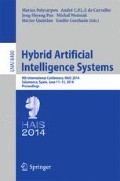Abstract
In our daily life, we often have the feeling of being exhausted due to mental or physical work, and a sense of performance degradation in the execution of simple tasks. The maximum capacity of operation and performance of an individual, whether physical or mental, usually also decreases gradually as the day progresses. The loss of these resources is linked to the onset of fatigue, which is particularly noticeable in long and demanding tasks or repetitive jobs. However, good management of the working time and effort invested in each task, as well as the effect of breaks at work, can result in better performance and better mental health, delaying the effects of fatigue. This paper details a non-invasive approach on the monitoring of fatigue of a human being, based on the analysis of the performance of his interaction with the computer.
Access this chapter
Tax calculation will be finalised at checkout
Purchases are for personal use only
Preview
Unable to display preview. Download preview PDF.
References
Williamson, R.J., Purcell, S., Sterne, A., Wessely, S., Hotopf, M., Farmer, A., Sham, P.C.: The relationship of fatigue to mental and physical health in a community sample. Social psychiatry and psychiatric epidemiology 40(2), 126–132 (2005)
Tucker, P.: The impact of rest breaks upon accident risk, fatigue and performance: a review. Work & Stress 17(2), 123–137 (2003)
Jaber, M.Y., Neumann, W.P.: Modelling worker fatigue and recovery in dual-resource constrained systems. Computers & Industrial Engineering 59(1), 75–84 (2010)
Woźniak, M., Graña, M., Corchado, E.: A survey of multiple classifier systems as hybrid systems. Information Fusion 16(0), 3–17 (2014); Special Issue on Information Fusion in Hybrid Intelligent Fusion Systems
Borrajo, M., B.B.C.E.B.J.C.J.: Hybrid neural intelligent system to predict business failure in small-to-medium-size enterprises. International Journal of Neural Systems 21(04), 277–296 (2011); PMID: 21809475
Harris, W.: Fatigue, circadian rhythm, and truck accidents. In: Vigilance, pp. 133–146. Springer, Heidelberg (1977)
Folkard, S., Tucker, P.: Shift work, safety and productivity. Occupational Medicine 53(2), 95–101 (2003)
Smith, A.P., Miles, C.: The effects of lunch on cognitive vigilance tasks. Ergonomics 29(10), 1251–1261 (1986)
Hart, S.G., Staveland, L.E.: Development of nasa-tlx (task load index): Results of empirical and theoretical research. Advances in Psychology 52, 139–183 (1988)
Reid, G.B., Nygren, T.E.: The subjective workload assessment technique: A scaling procedure for measuring mental workload. Advances in Psychology 52, 185–218 (1988)
Turner, R.: The handbook of operator fatigue. Ergonomics 56(9), 1486–1486 (2013)
McClernon, C.K., Miller, J.C.: Variance as a measure of performance in an aviation context. The International Journal of Aviation Psychology 21(4), 397–412 (2011)
Morris, T., Miller, J.C.: Electrooculographic and performance indices of fatigue during simulated flight. Biological Psychology 42(3), 343–360 (1996)
Tanabe, S., Nishihara, N.: Productivity and fatigue. Indoor Air 14(s7), 126–133 (2004)
Kahneman, D.: Remarks on attention control. Acta Psychologica 33, 118–131 (1970)
Pimenta, A., Carneiro, D., Novais, P., Neves, J.: Monitoring mental fatigue through the analysis of keyboard and mouse interaction patterns. In: Pan, J.-S., Polycarpou, M.M., Woźniak, M., de Carvalho, A.C.P.L.F., Quintián, H., Corchado, E. (eds.) HAIS 2013. LNCS, vol. 8073, pp. 222–231. Springer, Heidelberg (2013)
Author information
Authors and Affiliations
Editor information
Editors and Affiliations
Rights and permissions
Copyright information
© 2014 Springer International Publishing Switzerland
About this paper
Cite this paper
Pimenta, A., Carneiro, D., Novais, P., Neves, J. (2014). Analysis of Human Performance as a Measure of Mental Fatigue. In: Polycarpou, M., de Carvalho, A.C.P.L.F., Pan, JS., Woźniak, M., Quintian, H., Corchado, E. (eds) Hybrid Artificial Intelligence Systems. HAIS 2014. Lecture Notes in Computer Science(), vol 8480. Springer, Cham. https://doi.org/10.1007/978-3-319-07617-1_35
Download citation
DOI: https://doi.org/10.1007/978-3-319-07617-1_35
Publisher Name: Springer, Cham
Print ISBN: 978-3-319-07616-4
Online ISBN: 978-3-319-07617-1
eBook Packages: Computer ScienceComputer Science (R0)

